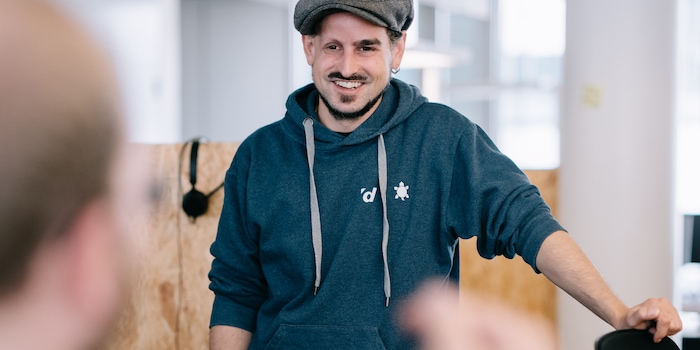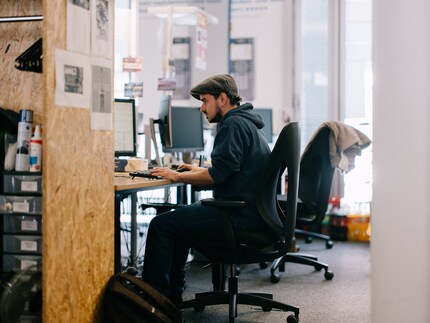
Behind the scenes
From retail to office job: how these two employees made it work
by Alina Frank

Florian Gröber, head of a six-person Customer Service team at Digitec Galaxus, opted to downshift, voluntarily descending the career ladder. From boss back to team member. A wise move? Where’s the challenge? The status? Questions that Florian had never asked himself before. But I had. With plenty of time to interview.
Florian, you’ve been working here for eleven years. Many employees want to climb the career ladder during their careers. A little over a year ago, you chose the opposite path and left your management position. What was the decisive factor for your downshifting?
I don’t give up easily and try to find alternate paths in any situation, but Covid made it difficult. In customer service, we were inundated with inquiries and had to hire additional staff. The team was suddenly twice as big and an additional responsibility for around fifty external temporary employees became too much for me. I could no longer lead what was always important to me as a boss: a personal, direct exchange with individual employees. The support and motivation of my team fell by the wayside. I simply had no more time for it. Additionally, I was suddenly responsible for too many different areas. An endless loop repeating in my head, even at night. In the end, it was a personal decision that matured practically over the weekend. A potential burnout wasn’t far off, something I wanted to prevent.
I managed the transition from boss to «normal» employee well.
How did your boss react to this decision?
Absolutely positive, which is why I still work here. He took me very seriously, supported me and immediately set everything in motion to relieve me. That way I managed the change from leader to «normal» employee well and was able to stay in the team. Our company is quite forward in this regard.

People on your team knew you as a boss. What was it like when you suddenly found yourself on the same level again?
We’ve always had a very cordial relationship. That was important to me as team leader. Of course, this was a process, and the team had to get used to the fact that I was no longer the contact person for everything. But I had a special status, especially in the beginning: I was a kind of link between the team and the new boss because I knew about a lot of things. Everyone appreciated that.
Status was never an issue for me.
Downshifting can mean a loss of status. How was it for you?
Hmm… (thinking). There were really no negative comments. Both my family and my immediate environment found my decision justified and supported me. They wouldn’t care if I were a dish cleaner either. So status was never an issue for them. Neither is it for me, by the way.
Do you work less now than before?
(laughs) Not necessarily. Even before switching roles, I didn’t accumulate unnecessary overtime. Work was just much more intense, to a point where I couldn’t switch off at home. I often sat in front of the TV in the evening thinking over new ideas or of how I could have done something better.
Financially, you had to cut back. Was that difficult?
I didn’t think much about that. The deciding factor was my health alone.
Previously, you had a lot of responsibility as a team leader. Now you’re a «normal» employee. Do you still get challenged?
Yes, absolutely. I can still initiate new projects in my current position, and I’m very happy to do so. I’ve taken up a special position in the post team for our After Sales Service. Here, I’m currently dealing with the issue of package damage. I do analyses and evaluations to find out how we can ensure that fewer parcels reach customers damaged.
However, I’d most like to further develop into coaching, which I’ve been pursuing for quite some time and already carry out within my team.

Coaching as in ensuring no one feels too pressured, endlessly replaying things in their head?
(laughs) That too, but I also find technical coaching or familiarisation training for new employees exciting.
Your responsibility had increased extremely within a year. As did the stress that came with it. What needs to change in the daily company routine to avoid a near-burnout?
I think in general there’s a lot of pressure on each person. Independent of where you work. Sometimes we just want to conform to society’s image of «all is well». You should always keep in mind what you really feel is important and where you can cut back.
Fortunately, our corporate culture is very humane and supervisors always have an open ear. Sure, the startup mentality used to be more prevalent in this regard. Every now and then, someone from upper management would work in one of our teams for a day and take stock. This definitely helps to find out how employees are doing, where problems lie or where stress is the greatest.
What’s better now than in your previous position?
My personal well-being, clearly. I have energy again, I’m motivated for new projects, and I’ve rediscovered my drive, an aspect I’ve always relied on. The pressure is gone, I can sleep again and my looseness is back, something I enjoy enormously. My work-life balance is at the level I want it to be.
Can you imagine taking on a leadership role again one day, or are you through?
At the moment, it’s rather a nonissue. But I wouldn’t categorically rule it out. Motivating a team and getting them excited about new things still appeals to me and is one of my strengths.
I sniff out the best behind-the-scenes stories the Digitec Galaxus universe has to offer. Why? Because I'm fascinated by people and stories. In my other life, I act on all types of stages, sometimes even in graveyards. As a voice-over artist for commercials, I've dubbed a pumpkin and a cow to name but a few.
News about features in our shop, information from marketing and logistics, and much more.
Show all